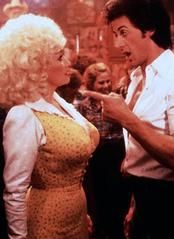Friday, July 6, 1984.
RHINESTONE. Written by Phil Alden Robinson and Sylvester Stallone. Original music and lyrics by Dolly Parton, adapted and conducted by Mike Post. Directed by Bob Clark. Running time: 110 Minutes. Rated Mature with the B.C. Classifier’s warning: occasional suggestive and coarse language.
THE TEMPTATION IS TO recast the project. Thinking about it, I really wonder if Rhinestone wouldn't have been a better movie without the star turns.
Casting, of course, is a business decision. Names like Sylvester Stallone and Dolly Parton have the kind of marquee value that makes a studio feel secure in its investment.
Maybe this was exactly the kind of deal that producer Howard (The Night the Lights Went Out in Georgia) Smith had in mind when he approached 20th Century Fox to turn country-western songwriter Larry Weiss's 1975 hit “Rhinestone Cowboy” into a movie.
The story, shaped by screenwriter Phil Alden Robinson, has struggling singer Jacqueline "Jake" Ferris (Parton) betting her lascivious manager Freddie "F.U." Ugo (Ron Leibman) that she can turn any normal male into a one-shot success on the stage of Ugo's urban cowboy club.
The setting is New York. Since the closest thing to normal within sight is Italian-American cabbie Nick Martinelli (Stallone), he becomes Jake's reluctant protege.
Here was an idea for a nice, lightweight romantic comedy contrasting a self-aware down-home entrepreneur with a smartass urban innocent. Such material brings out the best in Bob Clark, the director who did so well by Porky's (1982), and A Christmas Story (1983).
The trouble is, big stars scare Clark. He would've done better with the likes of Colleen (They All Laughed) Camp and Tom (Risky Business) Cruise, performers who are actors rather than celebrities.
The deal-makers preferred Dolly and Sly, steamroller talents who invariably shape projects to their own personalities. In Stallone’s case, this meant taking a hand in the scripting. For Parton, this meant control over the music.
As in virtually every outing since Rocky, Stallone trots out the Italian Stallion, his own variation on Everyman done in street style. An actor who never goes beyond caricature, Stallone is close to turning himself into Rodney Dangerfield.
Parton manages to project a more pleasing image. Following her own established pattern, she exercised control over the movie’s sound, producing most of the original music and lyrics.
Country's own Barbra Streisand, Parton easily dominates the picture. A gifted composer, actress, singer and comedienne, she effectively turns Rhinestone into a personal showcase.
The above is a restored version of a Province review by Michael Walsh originally published in 1984 For additional information on this archived material, please visit my FAQ.
Afterword: In the interests of full disclosure, I am not a Beatles fan. I've always considered Beatlemania the result of mad King George III’s dying curse upon his rebellious American colonies. I blame the so-called Fab Four — and the plague of English-accented rock bands that followed upon their fame — for the arrested development of the Boom Generation. They turned up at a time when the mass entertainment industries realized the profit potential of superstars in the pursuit of an emerging youth audience. Bad enough that a single musical genre — rock ’n’ roll — dominated the airwaves. What satirist Tom Lehrer had dismissed as “children’s music” now found its highest form of expression in the inanities produced by a quartet of Liverpudlians.
The best thing that I can say for them is that their arrival in America inspired debuting director Robert Zemeckis to make 1978’s I Wanna Hold Your Hand, one of my favourite film comedies. It tells the story of the madness that ensued in 1964 on February 8 and 9, when the Beatles appeared on television’s The Ed Sullivan Show. Zemeckis went on to a career that has included such enduring delights as the Back to the Future trilogy and Who Framed Roger Rabbit (1988).
Rhinestone director Bob Clark is another filmmaker with a string of interesting movies to his credit. Born in New Orleans, he’s an example of time and place coming together to bring out the best in an artist. His time was Canada’s tax-shelter era (1974-1982) and the place was Toronto, where landed immigrant Clark blossomed as a movie innovator.
Among the eight features he made during his decade-long stay were the game-changing horror film Black Christmas (1974), his inventive Sherlock Holmes thriller Murder by Decree (1979), his adaptation of Bernard Slade's Broadway play Tribute (1980), the now-classic teen comedy Porky's (1982) and the much-loved family feature A Christmas Story (1983). Rhinestone, the first film Clark made following his return to the U.S., was a creative disappointment, one that I really cannot blame on the Beatles.
